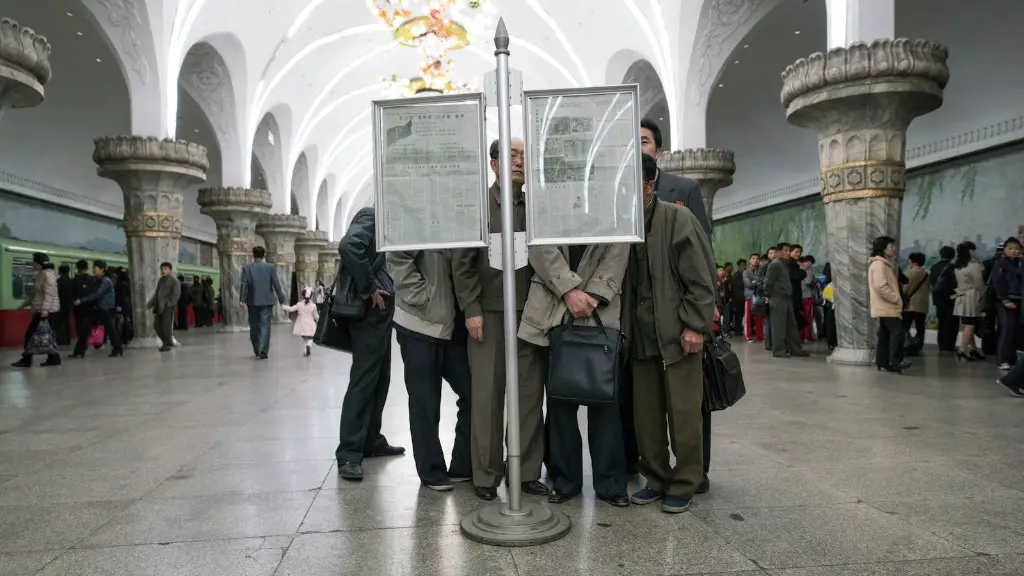Why Does China Back North Korea
The relationship between North Korea and China is one of the most enduring political alliances of the 21st century. North Korea has been a close ally of China since the Korean War, when China sent troops to help North Korea drive out foreign aggressors. Since then, China has been a strong supporter of North Korea, both economically and politically. But why does China continue to back North Korea and what are the implications of their close relationship?
China is fundamentally invested in the success of North Korea, seeing it as a strategic buffer between China and South Korea, its much wealthier and more powerful neighbour. China has been a major provider of aid to North Korea, with the International Institute for Strategic Studies estimating that China accounts for 80-90 percent of North Korea’s foreign trade. This economic investment is typically seen as an effort to support the North Korean government and ensure it remains in power. China also opposes international sanctions against North Korea, viewing them as a violation of North Korean sovereignty.
China and North Korea also share a number of cultural values and beliefs. The two countries are both governed by authoritarian regimes and share a common Communist ideology. China has also sought to maintain the status quo of enforced isolationism in North Korea, in order to prevent the undermining of its own political system. Furthermore, North Korea serves as a strategic partner for China, providing Beijing with leverage in its dealings with the United States and other countries in the region.
But the relationship between China and North Korea is not without its risks. North Korea’s nuclear and missile programmes have created a difficult diplomatic position for China, as it is seen as a supporter and protector of a nuclear-armed state. In addition, North Korea’s attempt to develop closer ties with other countries in the region, such as South Korea and Japan, could lead to a shift in the power dynamics in the region, to the detriment of China.
It is clear that China has much to gain from its relationship with North Korea, but it is also important to remember that the North Korean government is becoming increasingly unstable and unpredictable. As it develops closer ties with the rest of the world, North Korea could become a major source of disruption and tension in the region, making its relationship with China increasingly difficult to manage.
North Korea’s Nuclear weapons and its Impact on China’s Support
North Korea’s nuclear weapons programme has been a major source of tension and concern in the region and has been met with strong international condemnation. China, however, has chosen to remain largely silent on the issue and has not been willing to pressure its ally to abandon its nuclear ambitions. This is largely due to concerns over a potential collapse of the North Korean government and the consequences that could have for the region. Nevertheless, the continued development of North Korea’s nuclear weapons programmes has put China in a difficult position, as it is often seen as the main supporter of a nuclear armed state.
China has argued that sanctions and other forms of pressure are ineffective in convincing North Korea to abandon its nuclear weapons, instead encouraging a “peaceful and diplomatic” solution. China has also stated its desire to see denuclearisation on the Korean Peninsula, while at the same time maintaining friendly relations with North Korea. However, it is unclear if this approach will be successful in convincing North Korea to abandon its nuclear ambitions.
China could face increasing international criticism and sanctions if it continues to support North Korea’s nuclear programme. This could have a major economic impact for China, as well as further denting its reputation as a responsible power in the region. There is also the risk of further destabilising the region, as the risk of nuclear conflict remains a very real threat. For these reasons, China is increasingly being pressured to take a stance on North Korea’s nuclear ambitions.
Regional Power Dynamics and its Influence on China’s Support
The development of closer ties between North Korea and other countries in the region, particularly South Korea and Japan, poses a major challenge for China. China has traditionally viewed North Korea as a strategic buffer between itself and its powerful neighbours in the region. As North Korea develops closer ties with other countries, the balance of power in the region could shift, potentially to the detriment of China. In this context, China’s support for North Korea could be seen as an effort to retain a degree of control over the region.
North Korea’s increasing outreach to other countries in the region, such as South Korea and Japan, has also led to increased tensions between these countries and China. This could lead to further economic and political pressure on China, as other countries in the region attempt to contain China’s growing influence. For example, South Korea and Japan have proposed stronger economic and diplomatic ties, which could threaten China’s dominance in the region.
In addition, there are concerns that China could be using its influence over North Korea to pressure other countries in the region. For example, China has been accused of using its influence to prevent South Korea from deploying the US-made Terminal High Altitude Area Defense (THAAD) system on the Korean peninsula. This has further heightened tensions between China and other countries in the region and could potentially lead to further conflict.
The International Impact of China’s Support for North Korea
The continued support of China for North Korea has raised concerns in the international community. China’s support for North Korea has been viewed by some as a direct violation of international law and an illegal attempt to undermine the authority of the United Nations. In addition, the international community has expressed fears that the close alliance between China and North Korea could lead to the proliferation of nuclear technology and other weapons of mass destruction. This could have severe consequences for regional and global security and could potentially lead to a nuclear conflict.
China’s support for North Korea has also been criticised by many countries in the region. For example, South Korea has accused China of complicity in North Korea’s illicit activities and of being an obstruction to the peaceful resolution of the Korean conflict. Japan has also accused China of using its influence over North Korea to gain an advantage in regional power dynamics. As a result, some countries in the region have called for China to reconsider its support for North Korea.
Furthermore, there are fears that China’s support for North Korea could further exacerbate global tensions, as it has been seen as an attempt to challenge the existing international order. In particular, the United States has accused China of being complicit in North Korea’s development of nuclear weapons and has repeatedly urged China to take a tougher stance on the issue. As a result, the relationship between China and North Korea has become increasingly tense.
The Political Implications of China’s Support for North Korea
The close alliance between China and North Korea has profound political implications for both countries. In particular, it has raised questions about China’s commitment to international law and human rights. By supporting a government that has been widely criticised for its egregious violations of human rights, China has been accused of supporting a regime that is oppressive and brutal. This has further damaged China’s reputation as a responsible power and has raised questions about its commitment to upholding international standards.
Furthermore, China’s close relationship with North Korea has raised concerns about China’s pursuit of its own geopolitical ambitions. China’s support for North Korea has been viewed by many as a way of maintaining its influence in the region and preventing the emergence of rival powers. This has led to accusations that China is using North Korea as a tool to advance its own geopolitical and economic interests, rather than supporting North Korea out of genuine humanitarian concern.
Finally, the relationship between China and North Korea has raised questions about China’s commitment to upholding international law and its willingness to play a constructive role in global affairs. In particular, it has been argued that China should be more willing to pressure North Korea to respect the authority of the United Nations and to abide by international norms and standards.
Economic Benefits of China’s Support for North Korea
Despite the many political, diplomatic and security concerns over China’s support for North Korea, there is also evidence to suggest that China stands to benefit economically from its close relationship with North Korea. North Korea’s economic system is heavily dependent on foreign aid, with China being the main provider. This has created an economic interdependence between the two countries, with China providing the majority of North Korea’s imports and also buying a significant amount of its exports.
Furthermore, as North Korea’s economy has improved over recent years, there have been increasing opportunities for Chinese businesses to invest in the country. This has included Chinese companies that specialise in infrastructure, particularly in the energy and transport sectors. This increased investment has helped to improve North Korea’s economic position and has also led to improved relations between the two countries.
In addition, North Korea has become an important source of cheap labour for Chinese companies, particularly those in the manufacturing and apparel industries. This has provided China with a major source of cheap labour, while also helping to improve North Korea’s economic stability. Finally, North Korea is also seen as a potential market for Chinese goods and services, with Chinese companies increasingly looking to export their products to North Korea.
Conclusion
As China’s relationship with North Korea continues to evolve, its motivations for doing so remain complex and difficult to understand. On the one hand, it is clear that China has much to gain from its close alliance with North Korea, particularly in economic and political terms. On the other hand, there are also serious concerns about the implications of China’s support for North Korea, in terms of regional security and its commitment to international law. As the relationship continues to evolve, it remains to be seen if China’s support for North Korea can be reconciled with its obligations to the international community.





